
Aceclodin SP 100mg/325mg/15mg Tablet
Manufacturer
Meri-Odin Life sciences
Salt Composition
Aceclofenac (100mg) + Paracetamol (325mg) + Serratiopeptidase (15mg)
Key Information
Short Description
Aceclodin SP 100mg/325mg/15mg Tablet is a combination medicine used to relieve pain and swelling in various conditions like muscle pain, joint pain, and postoperative pain.
Dosage Form
Tablet
Introduction
Aceclodin SP 100mg/325mg/15mg Tablet is a combination medicine used to relieve pain and swelling in various conditions like muscle pain, joint pain, and postoperative pain. It effectively alleviates pain and inflammation in conditions like rheumatoid arthritis, ankylosing spondylitis, and osteoarthritis.
Directions for Use
Take this medicine in the dose and duration as advised by your doctor. Swallow it as a whole. Do not chew, crush or break it. Aceclodin SP 100mg/325mg/15mg Tablet is to be taken with food.
Safety Information
Side Effects
No common side effects listed.
Alcohol Warning
It is unsafe to consume alcohol with Aceclodin SP 100mg/325mg/15mg Tablet.
Breastfeeding Warning
Information regarding the use of Aceclodin SP 100mg/325mg/15mg Tablet during breastfeeding is not available. Please consult your doctor.
Pregnancy Warning
Aceclodin SP 100mg/325mg/15mg Tablet may be unsafe to use during pregnancy. Although there are limited studies in humans, animal studies have shown harmful effects on the developing baby. Your doctor will weigh the benefits and any potential risks before prescribing it to you. Please consult your doctor.
Interacting Medicines
Do not take it with any other medicine containing acetaminophen (drugs for pain/fever or cough-and-cold) without asking your doctor first.
How it works
Aceclodin SP 100mg/325mg/15mg Tablet is a combination of three medicines: Aceclofenac, Paracetamol and Serratiopeptidase. Aceclofenac is a non-steroidal anti-inflammatory drug (NSAID) and Paracetamol is an antipyretic (fever reducer). They work by blocking the release of certain chemical messengers in the brain that cause pain and fever. Serratiopeptidase is an enzyme which works by breaking down abnormal proteins at the site of inflammation and promotes healing.
Quick Tips
You have been prescribed this combination medicine for relieving pain and inflammation. Take it with food to avoid getting an upset stomach. It may cause dizziness and sleepiness. Do not drive or do anything that requires mental focus until you know how Aceclodin SP 100mg/325mg/15mg Tablet affects you. Avoid consuming alcohol when taking Aceclodin SP 100mg/325mg/15mg Tablet as it may cause excessive drowsiness and increase the risk of liver damage. Do not take it with any other medicine containing acetaminophen (drugs for pain/fever or cough-and-cold) without asking your doctor first.
Related Medicines
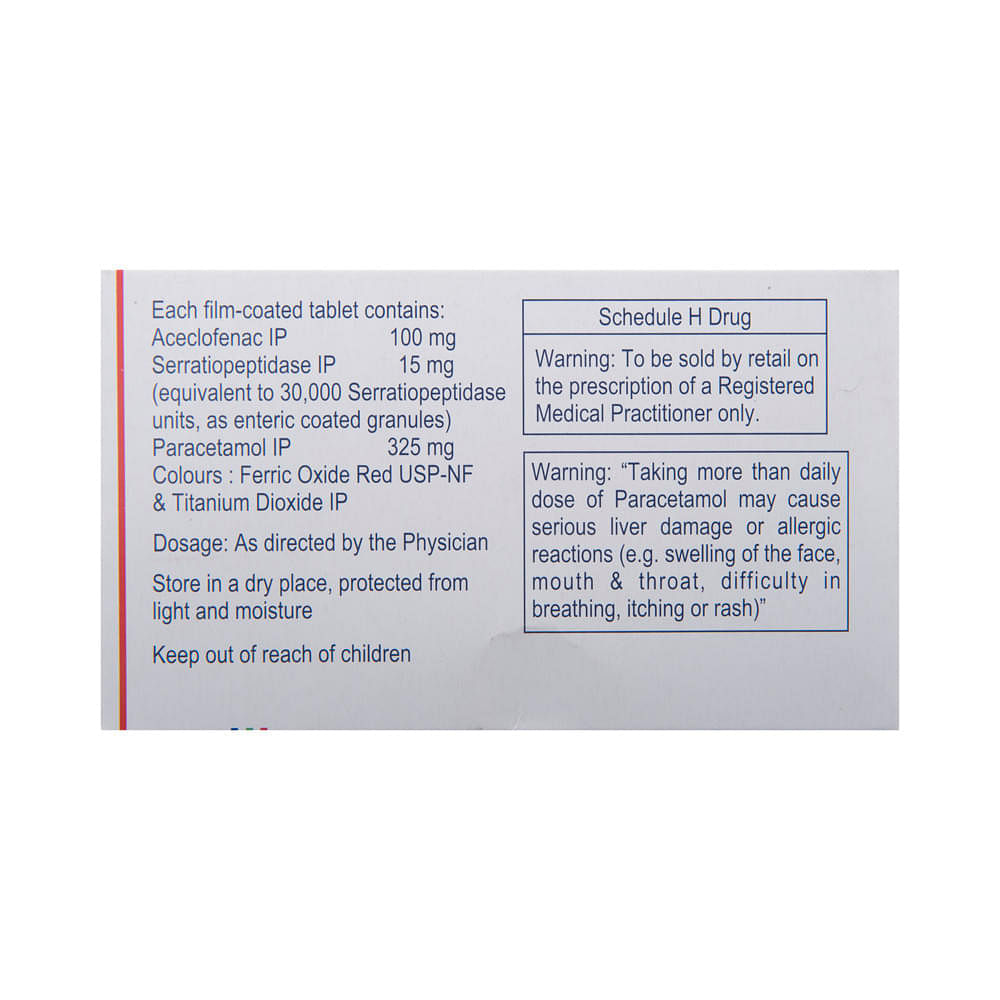
Zerodol-SP Tablet

Muclonac SP 100mg/325mg/15mg Tablet
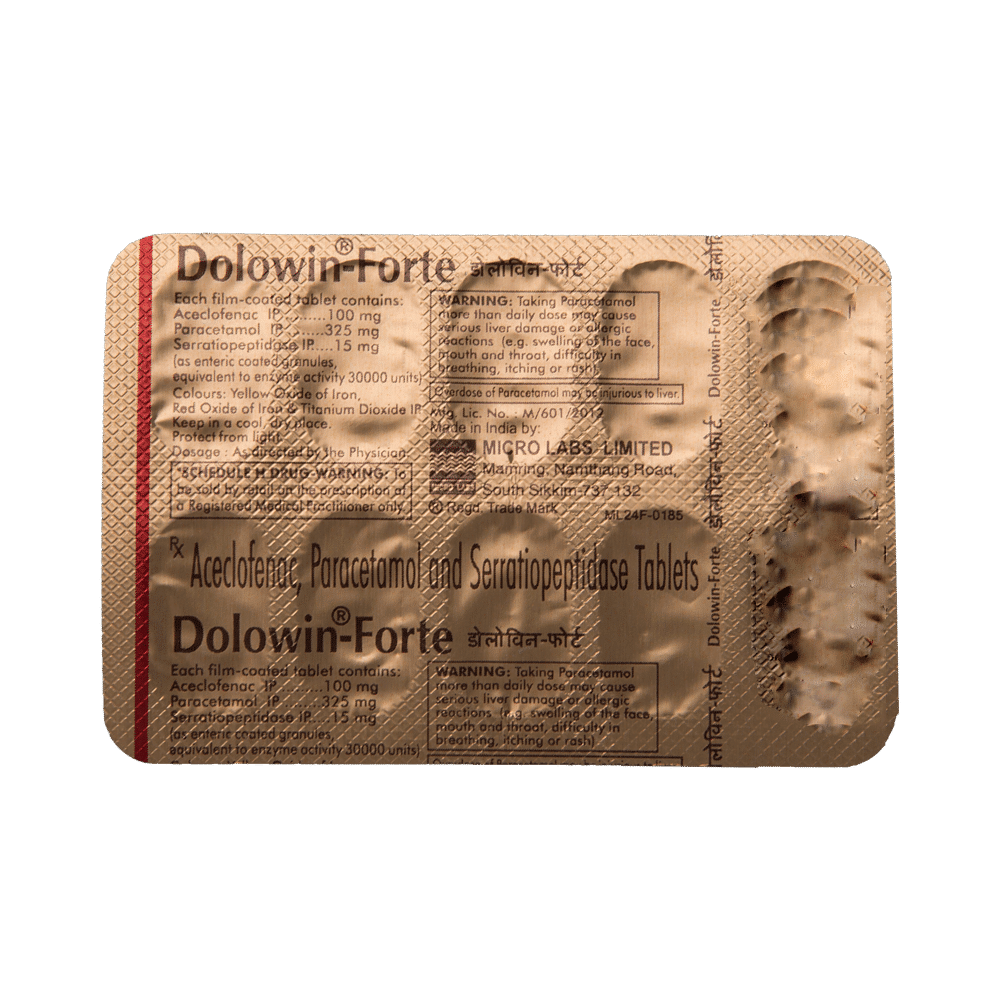
Dolowin-Forte Tablet
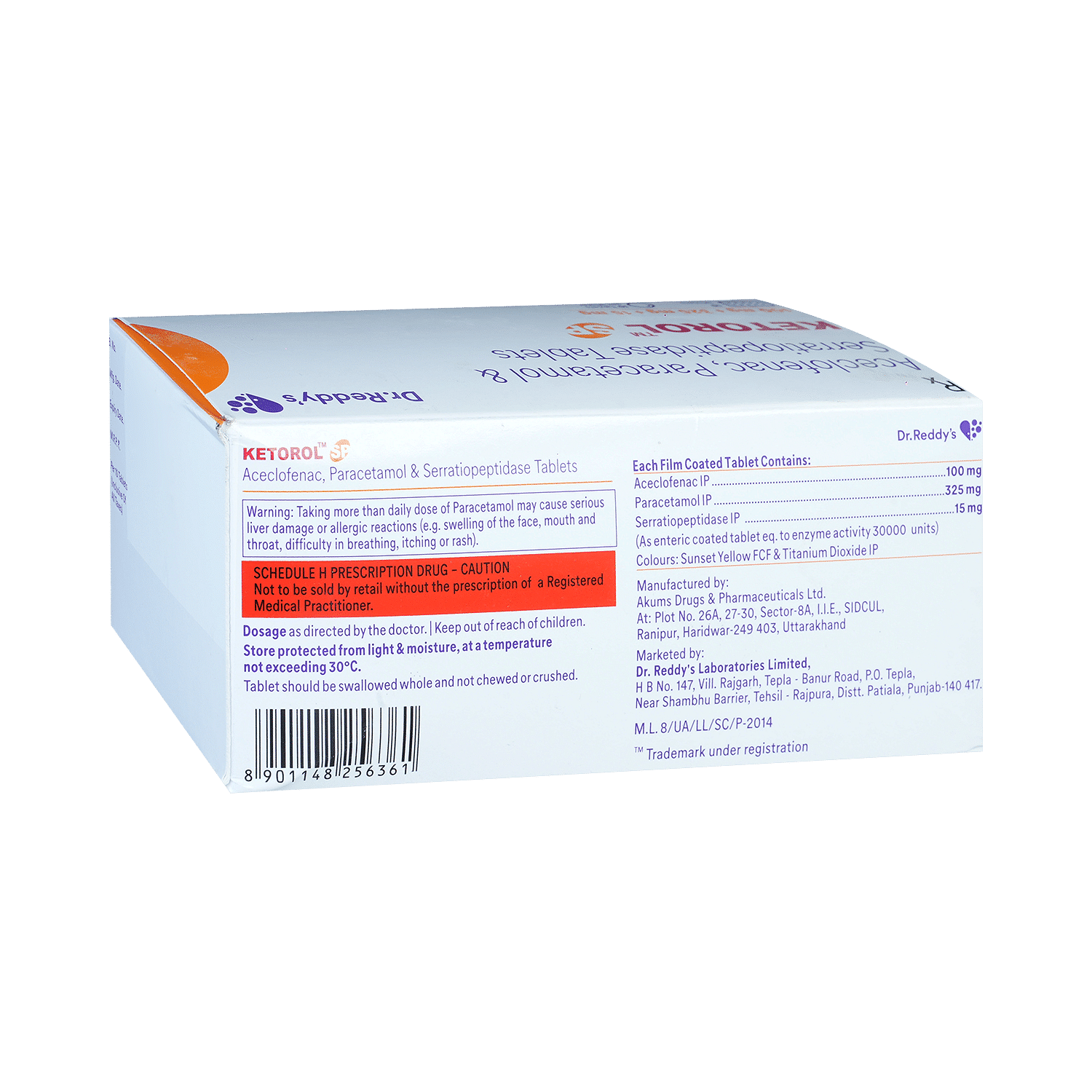
Ketorol SP Tablet
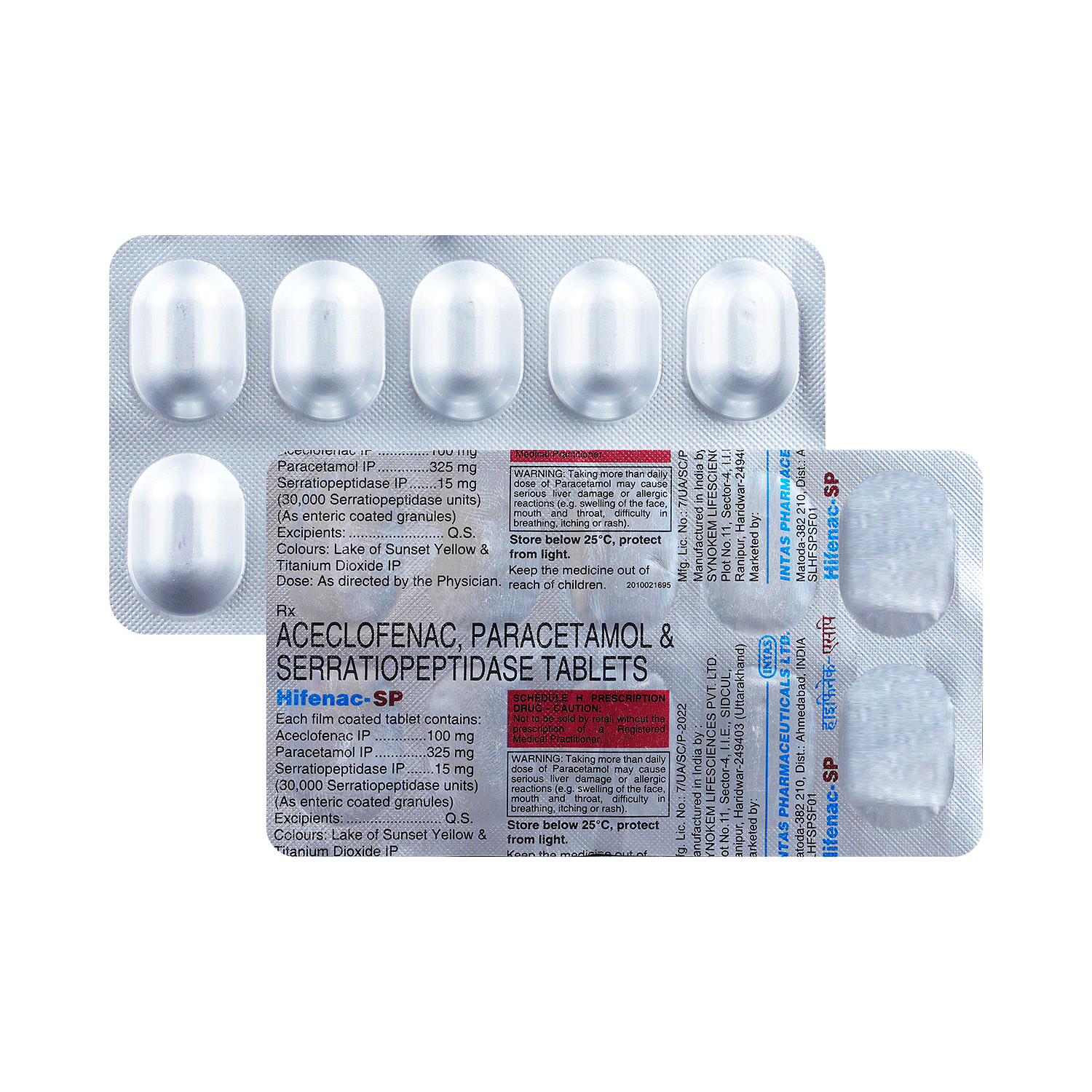
Hifenac-SP Tablet
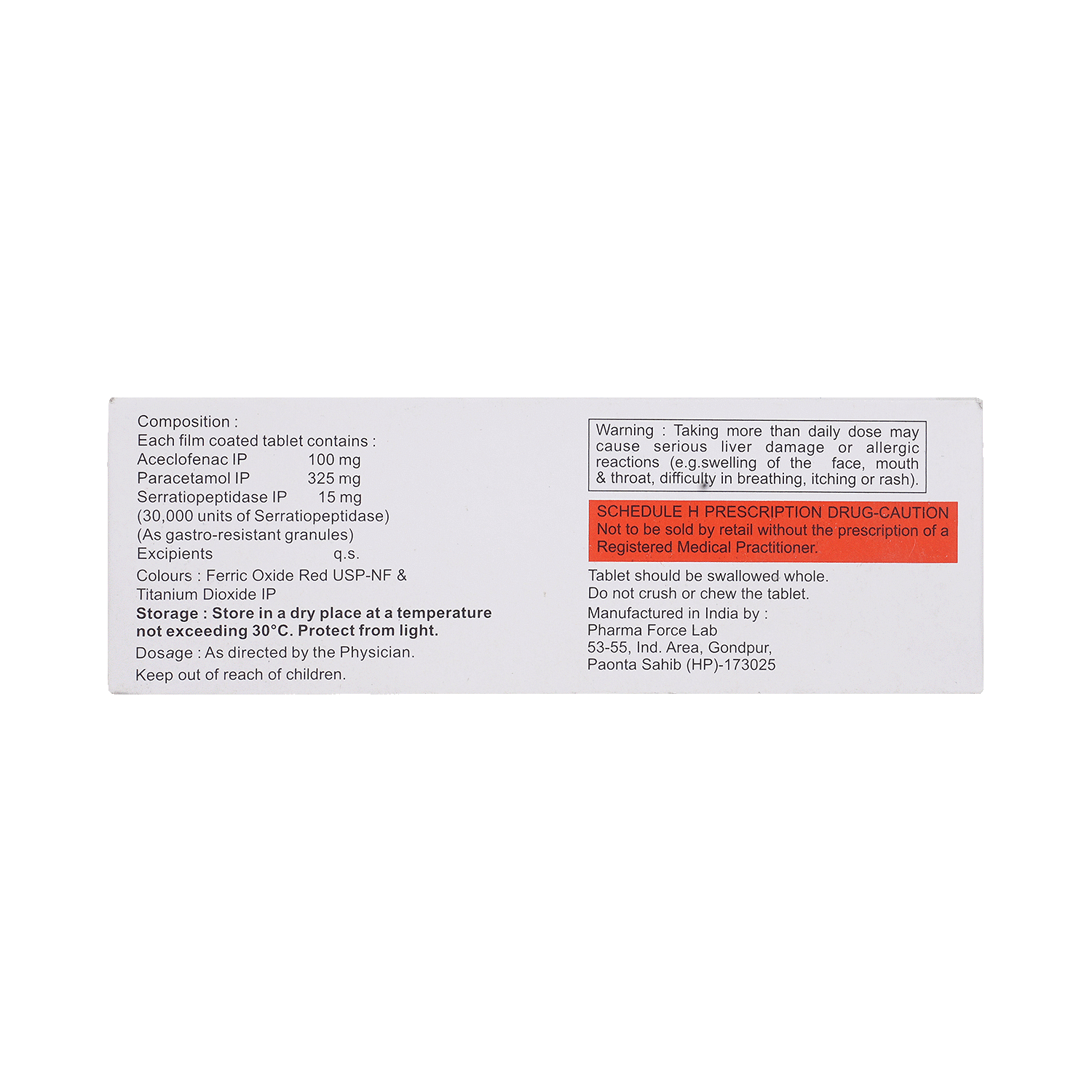
Dolokind-AA Tablet
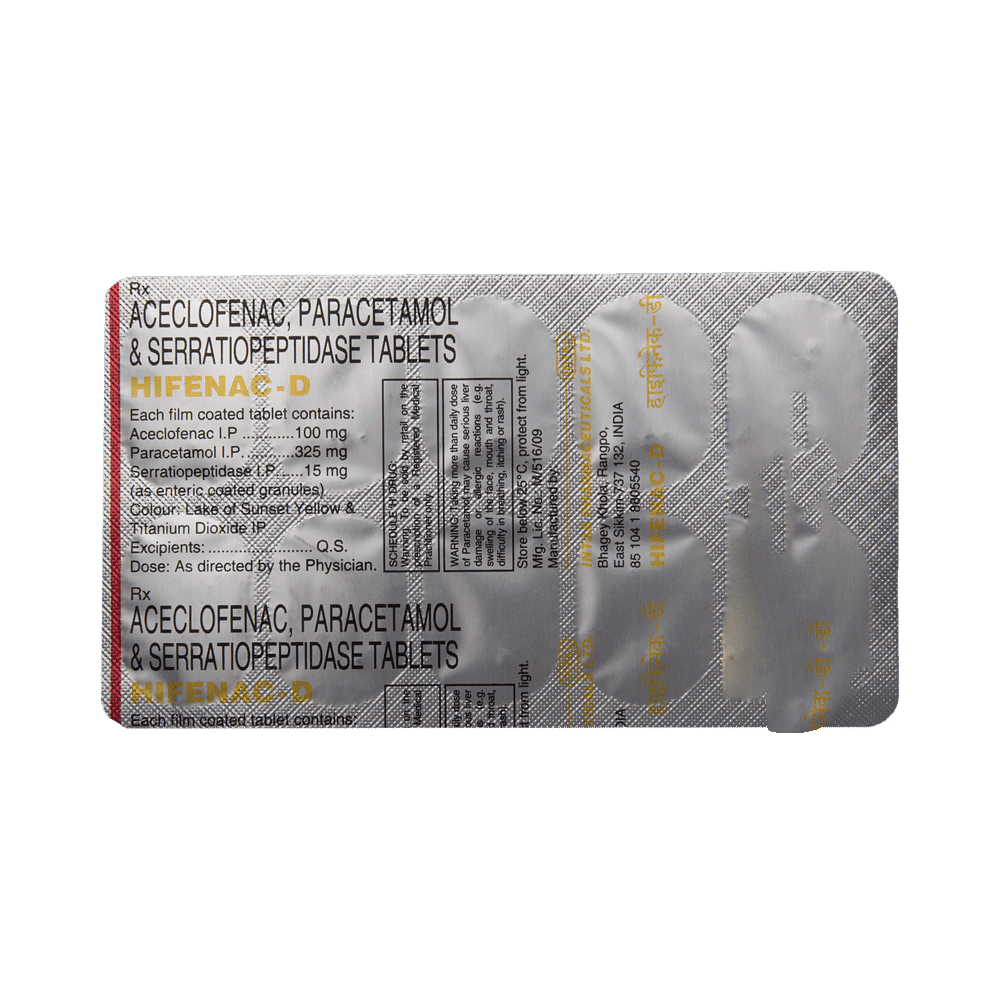
Hifenac-D Tablet

Erinac SP 100mg/325mg/15mg Tablet
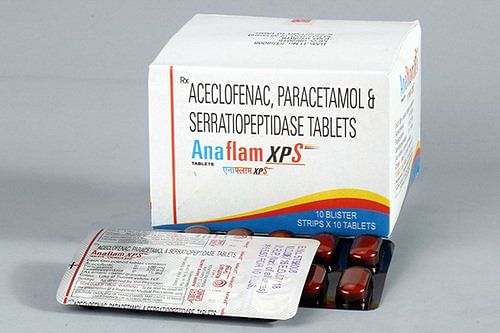
Anaflam Xps Tablet

Acewok Plus Tablet
Frequently asked questions
What is Aceclodin SP 100mg/325mg/15mg Tablet?
Aceclodin SP 100mg/325mg/15mg Tablet is a combination medication containing Aceclofenac, Paracetamol, and Serratiopeptidase. It works by reducing pain and inflammation in the body.
Is it safe to take Aceclodin SP 100mg/325mg/15mg Tablet?
Yes, for most patients, Aceclodin SP 100mg/325mg/15mg Tablet is a safe medication. However, some individuals may experience side effects such as nausea, vomiting, stomach pain, heartburn, and diarrhea. If persistent problems occur, inform your doctor promptly.
Can I stop taking Aceclodin SP 100mg/325mg/15mg Tablet when my pain is relieved?
This medication is usually taken for a short period. Discontinue use once the pain has subsided. However, if your doctor advises continued treatment, follow their guidance.
Can Aceclodin SP 100mg/325mg/15mg Tablet cause nausea and vomiting?
Yes, taking this medication may lead to nausea and vomiting. To alleviate these symptoms, take the medicine with milk, food, or antacids. Avoid consuming fatty or fried foods while on this treatment. If vomiting persists and dehydration signs appear (dark-colored urine, low frequency of urination), consult your doctor.
Can Aceclodin SP 100mg/325mg/15mg Tablet cause dizziness?
Yes, some patients may experience dizziness or lightheadedness while taking this medication. To manage these symptoms, rest for a while and resume once you feel better.
Are there any specific contraindications associated with taking Aceclodin SP 100mg/325mg/15mg Tablet?
Avoid using Aceclodin SP 100mg/325mg/15mg Tablet if you have a known allergy to its components or other painkillers. This medication should also be avoided in patients with a history of stomach ulcers, heart failure, high blood pressure, liver disease, or kidney issues.
Can I take Aceclodin SP 100mg/325mg/15mg Tablet with vitamin B-complex?
Yes, this medication can be taken along with vitamin B-complex preparations. Vitamin B-complex may help alleviate symptoms caused by a deficiency.
Can the use of Aceclodin SP 100mg/325mg/15mg Tablet cause damage to kidneys?
Yes, long-term use of this medication can lead to kidney damage due to lowered prostaglandins levels. Avoid using painkillers in patients with underlying kidney disease.
Can I take a higher dose of Aceclodin SP 100mg/325mg/15mg Tablet than recommended?
No, taking a higher dose can increase the risk of side effects. If you experience increased pain severity or inadequate pain relief with the recommended doses, consult your doctor for re-evaluation.
What are the instructions for storage and disposal of Aceclodin SP 100mg/325mg/15mg Tablet?
Keep this medication in its original packet or container, tightly closed. Store it according to the instructions on the pack or label. Dispose of unused medicine properly, avoiding consumption by pets, children, or other individuals.


